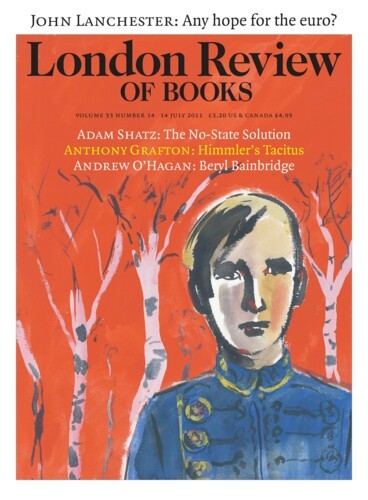In their foreword to the predictably dismaying Higher Education White Paper, Vince Cable and David Willetts deploy the standard language of the marketplace: the Higher Education Funding Council for England will take on ‘a major new role as a consumer champion’; ‘universities will be under competitive pressure to provide better quality and lower cost’ because they’ll be ‘responding to student demand’.* Any thought that academics might prefer to collaborate rather than compete as their sense of being under siege grows more desperate is swept aside by the dogma that everything is automatically improved by the Midas touch of competition. It’s true that students have always competed for places and degrees, universities for the ‘best’ students, researchers for funding and so on, and maybe some of them have been invigorated more by the competition than by any real liking for the subjects they’re studying. But maybe competition isn’t so much a good thing as an unfortunate consequence of demand for limited resources outstripping supply. Limiting the resources even further, as the government plans to do, will certainly lead to more of it. Whether or not that leads in turn to improvements in higher education is another matter.
The BBC and the Arts and Humanities Research Council, both of which have demonstrated a fair amount of craven compliance to the coalition government over the past year (more than 40 peer reviewers recently resigned from the AHRC in protest at its refusal to remove references to David Cameron’s Big Society from its ‘delivery plan’), have taken the rhetoric of academic competition to heart with dogged literal-mindedness. The New Generation Thinkers Scheme is a collaboration between Radio 3 and the AHRC – wouldn’t the results have been twice as good if they’d run competing competitions? – to find the ‘brightest academic minds with the potential to turn their ideas into fascinating broadcasts’. Announcing the winners, the Guardian called it an ‘X Factor-style talent search’. More than 1000 people applied (10,000 according to Philip Dodd on Night Waves, though I think he must have misread the script). The numbers took the organisers by surprise and led them to extend the judging period, but they shouldn’t have done: the AHRC ought to know better than anyone that academics these days, of any generation, especially in the humanities, have to go after any ‘funding opportunity’ that comes their way.
The lucky ten, Radio 3’s ‘first-ever resident New Generation Thinkers’, ‘will be given the unique opportunity to develop their broadcasting ideas hand in hand with Radio 3 and appear on air in special New Generation Thinkers debates and sessions’: the equivalent of The X Factor’s Christmas number one followed by an instant return to obscurity. The Radio 3 masterminds’ specialised subjects include the history of fan mail, the commercialisation of British archaeology, The Arabian Nights, and cultural responses to the Rwandan genocide. The contributions they’ve made so far to Night Waves have been interesting enough (and must have boosted their ‘impact’ ratings no end), but then these particular academics are hardly obscure. Alexandra Harris (‘A Brief History of Being Cold: Journeys through English Art and the Elements’) won last year’s Guardian First Book Award; Rachel Hewitt (‘Britain in the 1790s: The Age of Despair’) wrote a bestselling history of the Ordnance Survey. ‘We are the people who can represent the hopes, the dreams, the aspirations of the British people,’ Ed Miliband – who every day in every way inexplicably tries to make himself as indistinguishable from Nick Clegg as possible – has said, speaking with resounding hollowness on behalf of his colleagues on both sides of the House of Commons. Of course.
Send Letters To:
The Editor
London Review of Books,
28 Little Russell Street
London, WC1A 2HN
letters@lrb.co.uk
Please include name, address, and a telephone number.

